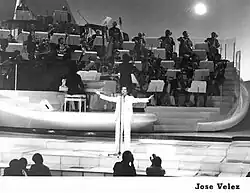Spain in the Eurovision Song Contest 1978
| Spain in the Eurovision Song Contest 1978 | ||||
|---|---|---|---|---|
| Eurovision Song Contest 1978 | ||||
| Participating broadcaster | Televisión Española (TVE) | |||
| Country | ||||
| Selection process | Internal selection | |||
| Announcement date | 8 March 1978 | |||
| Competing entry | ||||
| Song | "Bailemos un vals" | |||
| Artist | José Vélez | |||
| Songwriters |
| |||
| Placement | ||||
| Final result | 9th, 65 points | |||
| Participation chronology | ||||
| ||||
Spain was represented at the Eurovision Song Contest 1978 with the song "Bailemos un vals", written by Manuel de la Calva and Ramón Arcusa of Dúo Dinámico, and performed by José Vélez. The Spanish participating broadcaster, Televisión Española (TVE), internally selected its entry for the contest.
Before Eurovision
Televisión Española (TVE) assembled a jury of 26 members from across the country who, locked up on 7 March 1978, internally selected "Bailemos un vals" performed by José Vélez as the Spanish entry for the Eurovision Song Contest 1978.[1] The song was written by Manuel de la Calva and Ramón Arcusa, the members of Dúo Dinámico. The title of the song, the songwriters, and performer were announced on 8 March.[2] TVE filmed a program dedicated to Vélez on location in the Canary Islands, where he is from, directed by Valerio Lazarov and from where the preview video for the song was extracted.[3] He also recorded the song in French with lyrics by Sophie Makhno as "Voulez-vous danser avec moi" and in German as "Señorita wir sind ein Paar".[4]
At Eurovision

On 22 April 1978, the Eurovision Song Contest was held at the Palais des Congrès in Paris hosted by Télévision Française 1 (TF1) and broadcast live throughout the continent. Vélez performed "Bailemos un vals" 7th in the evening, following France and preceding the United Kingdom. Ramón Arcusa conducted the event's orchestra performance of the Spanish entry. Vélez was accompanied on stage by Trío La La La as backing singers. At the close of voting "Bailemos un vals" had received 65 points, placing 9th in a field of 20.[5]
TVE broadcast the contest in Spain on TVE 1 with commentary by Miguel de los Santos.[6] Before the event, TVE aired a talk show hosted by Matías Prats Luque introducing the Spanish jury, which continued after the contest commenting on the results.[7]
Voting
TVE assembled a jury panel with eleven members, a president, and a secretary (who was also the spokesperson). The following members comprised the Spanish jury:[8]
- María Fernanda Azagra – housewife
- Pablo Hardy – industrialist
- Carmen Pérez Cobas – student
- Daniel Martín Farias – building engineer
- Manolo Royo – comedian
- Pilar Ruiz – model
- Jose Ignacio Martín Pulido – postman
- Jesús Tardón Dimas – labourer
- Manuela Vega Benigno – secretary
- Justo Miguel Redondo – odontologist
- Bárbara Rey – actress
The jury was chaired by Miguel Ángel Gozalo, who was the director of media relations at TVE, with Matías Prats as secretary and spokesperson, and Luis de los Ríos as scrutineer. These did not have the right to vote, but the president decided in the event of a tie. The jury awarded its maximum of 12 points to Luxembourg, who was represented by the Spanish duo Baccara.
|
|
References
- ^ Presentation of the Spanish Jury - Eurovision Song Contest 1978 (in Spanish). 22 April 1978. Televisión Española.
- ^ "José Vélez a Eurovisión con un vals". Pueblo (in Spanish). Madrid, Spain. 9 March 1978. p. 28 – via Virtual Library of Historical Newspapers.
- ^ "Presentación a los medios informativos de Barcelona, del cantante José Vélez que representará a España en el Festival de la Canción de Eurovisión 1978". EFE (in Spanish). 31 March 1978.
- ^ "Spain 1978". diggiloo.net.
- ^ "Final of Paris 1978". European Broadcasting Union. Archived from the original on 11 April 2021. Retrieved 11 April 2021.
- ^ "1er programa – Sábado" [First Program – Saturday]. Tele Pueblo (in Spanish). Madrid, Spain. 22 April 1978. pp. 2–3. Retrieved 27 June 2024 – via Biblioteca Virtual de Prensa Histórica.
- ^ "El sorprendente momento de Matías Prats: tararea en directo la canción que ganó Eurovisión cuando fue presentador del jurado". Onda Cero (in Spanish). 24 May 2021.
- ^ Cayon, José A. (22 April 1978). "Esta noche Eurovisión-78" [Tonight Eurovision-78] (PDF). La Gaceta del Norte (in Spanish). Bilbao, Spain. p. 48. Retrieved 5 October 2024 – via Bizkaiko Foru Liburutegia.
- ^ a b "Results of the Final of Paris 1978". European Broadcasting Union. Archived from the original on 11 April 2021. Retrieved 11 April 2021.